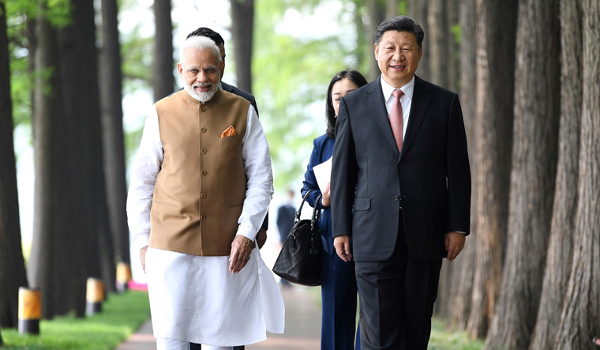The Global Times, considered the mouthpiece of the Chinese government, has said that there is no Indian leader right now who is of PM Modi’s political stature and that there is little doubt that will emerge as the largest party in parliament. The BJP’s organizational strength is better than that of the opposition and hence Modi is likely to rule for another term, says the author in Global Times. The piece also hails PM Modi’s diplomatic initiatives and foreign policy during his tenure while recognizing his moves were always in interest of India.
The article written by Lu Yang, a research fellow at Tsinghua University, categorically states that after taking office in 2014, PM Modi brought about a paradigm shift in diplomacy where all neighboring countries received ‘required attention’. At the international level great power diplomacy of the Modi government was carried out actively and the foreign policy adopted stimulated investments, noted the article. While Modi’s political opponents say that his governments foreign policy have no direction, China seems to have seen through such allegations and has recognized his efforts in normalizing ties with all countries including the neighborhood.
Calling Modi as a pragmatist, the author writes, “As a pragmatist, he realized that strengthening regional cooperation and stability in South Asia would help achieve this goal. To this end, at his inauguration ceremony, he invited the leaders of the South Asian Association for Regional Cooperation (SAARC) countries, including then Pakistani prime minister Nawaz Sharif; the first country he visited was Bhutan; and he solved the long-standing territorial dispute with Bangladesh by exchange of enclaves.” It can be recalled that PM Modi resolved the long standing dispute with Bangladesh within a year of taking oath as PM when he and Sheikh Hasina signed the Land Boundary Agreement in which India secured control of 510 acres of land while Bangladesh got 10,000 acres of land at the India-Bangladesh border thereby settling the 41-year old border dispute.
In regards to the ties with Pakistan, the author recognizes the initial moves of PM Modi to better the ties. “Although Modi was hawkish on relations with Pakistan in the 2014 general election, he tried to improve ties once in office”, says the article.
On Ties with China
The author states that Modi sought closer investment and trade links while adopting tougher strategic stance with China. “With China, a strong neighbor, Modi sought closer investment and trade links while adopting a tougher strategic stance. Sino-Indian relations had a good start after Modi took power in 2014. It was highlighted by a hometown diplomacy in September that year – President Xi Jinping paid a state visit to India and Modi shared his 64th birthday with Xi in Ahmedabad.” This goes on to highlight the pragmatic approach of the Modi government on ties with China. Despite the hiccups in ties during Doklam stand-off, both the countries are ‘adjusting their attitude toward each other’ and ‘setting dialogue and cooperation as main focus’, writes the author.
Though the author pitches for the Belt and Road initiative of China in South Asia and complains that India under Modi did not become part of it, the author recognizes that relations improved rapidly in 2018. The informal meeting between Modi and Xi in Wuhan in late April 2018 became a milestone in bilateral relations, says the author.
The article that almost pitches for Modi and his foreign policy gains importance as it has appeared in Global Times which is considered as the mouthpiece of the Chinese government. The tight control on the media ensures that almost no content that emerges from China goes without the scrutiny of the government. Given this aspect, this article can be viewed as the Chinese governments opinion on Indian elections and apparent return of Modi as PM once again.
Source: Organizer
Image Courtesy: PTI
You may also like
-
IAF Aircraft Set Course For Exercise Eastern Bridge VII At Oman
-
India-us Working Together In Areas Like Critical Minerals, Supply Chains And Advanced Technologies: Shri Piyush Goyal
-
Defence Secretary to co-chair 5th India-Philippines Joint Defence Cooperation Committee meeting in Manila
-
2nd India-Japan Finance Dialogue held in Tokyo on 6th September, 2024
-
Prime Minister, Shri Narendra Modi welcomes Crown Prince of Abu Dhabi
